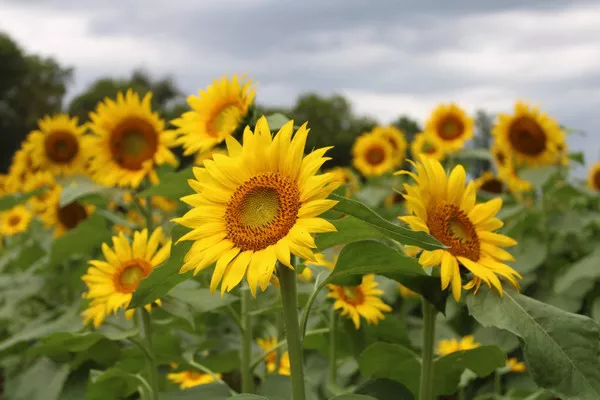Sunflowers (Helianthus annuus) are vibrant and beautiful additions to any garden, attracting bees and adding a splash of color. However, ants can become unwelcome visitors, causing damage and disrupting the health and growth of sunflowers. It is essential to address ant infestations promptly and effectively to protect your sunflower plants. In this article, we will explore various strategies and natural techniques to get rid of ants on sunflowers, ensuring their wellbeing and vitality.
1. Identify the Ant Species
Before implementing any ant control methods, it is crucial to identify the ant species present in your garden. Different ant species may have varying behaviors and preferences, requiring specific eradication approaches. Observe their appearance, behavior, and nesting patterns to determine the most appropriate strategy.
2. Maintain Cleanliness
A clean garden environment is key to deterring ants from sunflowers. Regularly remove fallen leaves, debris, and any decaying plant matter that could attract ants. By eliminating potential food sources, you discourage their presence and limit their access to sunflowers.
3. Physical Barriers
Creating physical barriers around sunflowers is an effective way to prevent ants from reaching the plants. Apply a sticky substance such as Tanglefoot or petroleum jelly around the stem base to create an impassable barrier. Ensure the barrier remains intact and reapply if necessary, especially after rainfall.
4. Natural Repellents
Several natural substances work as effective repellents to deter ants. Consider using the following options:
Diatomaceous Earth: Sprinkle food-grade diatomaceous earth around the sunflower base and surrounding areas. This powdery substance damages the ant’s exoskeleton, leading to dehydration and eventual demise.
Vinegar Solution: Create a solution by mixing equal parts of vinegar and water. Spray this solution directly on the ant trails, entry points, and sunflower stems. The strong scent of vinegar disrupts their chemical trail, discouraging further exploration.
Citrus Peels: Place orange or lemon peels around the sunflowers, as ants dislike the strong citrus scent. Replace the peels every few days to maintain effectiveness.
5. Horticultural Oils
Horticultural oils, such as neem oil or insecticidal soap, can be effective in controlling ant populations. These oils suffocate and repel ants without causing harm to sunflowers. Dilute the horticultural oil according to the manufacturer’s instructions and spray it directly on the ants and their nests.
6. Biological Controls
Introducing natural predators or parasites that feed on ants can help control their population. Nematodes, tiny worms that are harmless to plants and humans, prey on ants and their larvae. These beneficial organisms can be purchased from garden supply stores and applied to the soil surrounding the sunflowers.
7. Ant Bait Stations
Ant bait stations are an efficient way to eliminate entire ant colonies. Place bait stations near ant trails or suspected nesting sites. Opt for ant baits containing slow-acting insecticides so that the worker ants carry the poison back to the colony, infecting the entire population. Follow the manufacturer’s instructions carefully when using ant bait stations.
8. Organic Pesticides
As a last resort, organic pesticides specifically labeled for ant control may be used. Look for products containing ingredients like pyrethrin or spinosad, which are derived from natural sources. Apply these pesticides sparingly and precisely, targeting the ant-infested areas while minimizing harm to beneficial insects.
9. Regular Monitoring
Keep a watchful eye on your sunflowers even after implementing ant control measures. Regularly inspect the plants, especially the stems, leaves, and blossoms, for any signs of renewed ant activity. Early detection ensures timely intervention and prevents further infestation.
10. Integrated Pest Management (IPM)
Adopting an integrated pest management approach can effectively address ant problems while minimizing harm to the environment. IPM combines multiple strategies, including cultural, physical, biological, and chemical controls, to manage pests sustainably. By integrating various techniques, you can maintain a balance between pest control and the overall health of your garden.
Conclusion
Ants can pose a threat to sunflowers, affecting their growth and vitality. By identifying the ant species, maintaining cleanliness, using physical barriers, natural repellents, horticultural oils, and biological controls, you can effectively eliminate ants from your sunflower garden. Ant bait stations and organic pesticides can be utilized as a last resort when other methods fail. Remember to practice regular monitoring and adopt an integrated pest management approach for long-term success in keeping ants away from your sunflowers. With these strategies in place, you can enjoy healthy, vibrant sunflowers that flourish in a pest-free environment.


